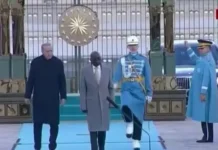Tinubu pardons Macaulay, Vatsa, Farouk Lawan, others
President Bola Tinubu has approved wide-ranging acts of clemency, granting posthumous pardons to prominent historical figures, including nationalist Herbert Macaulay and the late Major General Mamman Jiya Vatsa, who was executed in 1986.
The decision, endorsed by the National Council of State, was announced after its meeting on Thursday in Abuja, and reflects President Tinubu’s use of his constitutional power of mercy.
In a statement signed by Bayo Onanuga, Special Adviser to the President on Information and Strategy, Mr Tinubu’s latest exercise of executive clemency extends to 175 individuals, including deceased national icons, former political figures, and serving inmates across the country.
Herbert Macaulay, revered as one of Nigeria’s foremost nationalists and co-founder of the National Council of Nigeria and the Cameroons, NCNC, alongside Dr. Nnamdi Azikiwe, was among those granted a posthumous pardon.
Mr Macaulay, who died in 1946, had been convicted by British colonial authorities in 1913 and barred from holding public office—a stigma that, until now, remained on his record.
Major General Mamman Vatsa, a poet and military officer executed by the military regime of General Ibrahim Babangida for alleged treason in 1986, was also granted a posthumous pardon.
His family and advocates have long maintained that his trial was unjust.
In addition, the Ogoni Nine—Ken Saro-Wiwa, Baribor Bera, Saturday Dobee, Nordu Eawo, Daniel Gbooko, Paul Levera, Felix Nuate, Barinem Kiobel, and John Kpuine—received formal presidential pardons nearly three decades after their controversial execution in 1995.
President Tinubu also awarded national honours to the “Ogoni Four”: Chief Albert Badey, Chief Edward Kobani, Chief Samuel Orage, and Theophilus Orage, who were earlier recommended for recognition by the committee.
Lawan, Others Among Former Officials Pardoned
The President also pardoned four former convicts, including former lawmaker Farouk Lawan, who had been jailed for bribery; Anastasia Daniel Nwaobia, Hussaini Umar, and Ayinla Saadu Alanamu.
According to the statement, the individuals were pardoned “to enable them to reintegrate into society, having demonstrated sufficient remorse.”
Others granted clemency include Nweke Francis Chibueze, serving a life term for drug-related offences, and Dr. Nwogu Peters, who had completed 12 years of a 17-year sentence for fraud.
President Tinubu also approved clemency for 82 inmates and reduced the sentences of 65 others.
In a humanitarian gesture, he commuted the death sentences of seven inmates to life imprisonment.
The President acted on the recommendations of the Presidential Advisory Committee on the Prerogative of Mercy, PACPM, chaired by the Attorney General of the Federation and Minister of Justice, Prince Lateef Fagbemi, SAN.
Other members include former Attorney General Chief Akinlolu Olujinmi, Professor Alkasum Abba, Professor Nike Y. Sidikat Ijaiya, Justice Augustine B. Utsaha, and Dr. Onwusoro Maduka, who serves as Secretary.
Institutional representatives from the Nigeria Police Force, Nigerian Correctional Service, National Human Rights Commission, Nigerian Supreme Council for Islamic Affairs, NSCIA, and the Christian Association of Nigeria, CAN, are also on the committee.
In its report presented to the Council of State, the PACPM said it reviewed 294 applications, interviewing 175 inmates — 160 male and 15 female.
It recommended 82 for clemency, two for full pardons, 65 for sentence reduction, and seven death-row inmates for commutation to life imprisonment.
Additionally, 15 ex-convicts were proposed for presidential pardon — including 11 deceased individuals.
The committee said its recommendations were based on several criteria, including:
Old age (60 years and above)
Terminal or severe illness
Youth (16 years and below)
Long-term incarceration (10 years or more with good conduct)
Remorse and rehabilitation through vocational training
Exemplary behaviour recommended by correctional officers
Nigerian prisoners repatriated from abroad
The Secretary to the Government of the Federation, George Akume, had inaugurated the PACPM on January 15, 2025, to promote justice, rehabilitation, and human rights in the criminal justice system.
Thursday’s Council of State endorsement marks the culmination of the committee’s first major exercise under the Tinubu administration.
READ ALSO: President Bola Tinubu: Gaps between expectations and reality, by Engr. Bello Gwarzo Abdullahi, FNSE
Follow the Neptune Prime channel on WhatsApp:
Do you have breaking news, interview request, opinion, suggestion, or want your event covered? Email us at neptuneprime2233@gmail.com





